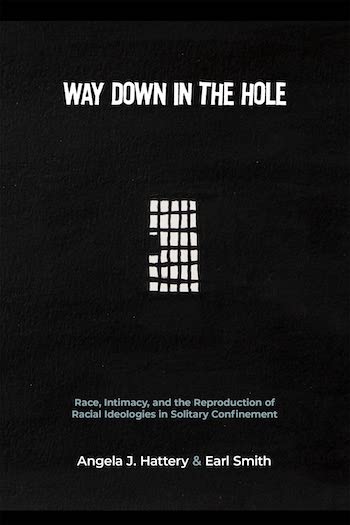Book Review: “Way Down in the Hole” — The Agonies of Solitary Confinement
By Bill Littlefield
Some readers may be surprised to learn that a high percentage of the men and women who spend time in solitary confinement have been diagnosed with severe mental illness.
Way Down in the Hole: Race, Intimacy, and the Reproduction of Racial Ideologies in Solitary Confinement by Angela J. Hattery & Earl Smith, 278 pages, Rutgers University Press.
 To gather material for Way Down in the Hole, the authors spent time in several state prisons where solitary confinement is one form of disciplining incarcerated men and women. Hattery, Smith, and their associates interviewed men and women who were serving time in solitary confinement units. They also interviewed some of the men (and a few women) working as corrections officers (COs) in those units.
To gather material for Way Down in the Hole, the authors spent time in several state prisons where solitary confinement is one form of disciplining incarcerated men and women. Hattery, Smith, and their associates interviewed men and women who were serving time in solitary confinement units. They also interviewed some of the men (and a few women) working as corrections officers (COs) in those units.
Many readers won’t be surprised to learn that incarcerated people are sent to solitary confinement for all sorts of reasons. Sometimes they are removed from the general population in the prison for their own safety, or for the safety of others in that population, or the safety of the CO’s. Sometimes incarcerated folks are sent to solitary confinement because they have broken rules: they’ve stashed more food in their cells than they’re allowed to have; they’ve failed to obey a CO’s order; they’ve failed to keep their cells clean.
Some readers may be surprised to learn that a high percentage of the men and women who spend time in solitary confinement have been diagnosed with severe mental illness, and that lots of incarcerated men and women who have not been so diagnosed before spending time in solitary have developed significant mental illness as a result of enduring long stretches there.
As the subtitle of Way Down in the Hole suggests, Hattery and Smith are especially interested in the “racial ideologies” apparent among the corrections officers who spend their time policing the solitary confinement units. Nearly all of the officers interviewed were white, and the authors argue, convincingly, that the only way those officers can report to work each day is by embracing various lies, the most basic of which is that Black people are inferior to white people, if not inherently criminal.
Hattery and Smith also explore at length the resentment of white officers who believe that the incarcerated men and women in their charge, nearly all of them people of color, are getting better deal in life than the officers themselves, many of whom hate their work, struggle with physical and mental problems associated with their jobs, and resent having to bring food to the men who are incarcerated, escort them to and from the shower, conduct strip searches, and otherwise, as one officer puts it, “babysit them.”
Of course, the circumstances the authors describe are dehumanizing for all involved. It is a well-established contention that the act of colonizing destroys the humanity of both the colonized and the powers doing the colonizing. The CO’s endure, at least in part, by holding firm to the same desperate and destructive assertion that has often characterized poor, disadvantaged white folks: “At least I’m not a lesser animal. I’m not Black.” As the authors put it, “Just as slave owners had to lie to themselves to justify the fact that they owned people, CO’s, too, have to lie to themselves to justify the fact that their job is to lock men in cages and treat them in dehumanizing ways.”
Hattery and Smith are not optimistic that we’ll soon see a culture less given to dehumanizing Black men in great numbers by imprisoning them and then subjecting them to solitary confinement. But they do suggest a few approaches that might address the perpetual “reproduction of racial ideologies.” The simplest would create opportunities for incarcerated men and women and the CO’s in the institutions where they’re caged to meet together in classes. There they could discuss their individual circumstances in a context where they could speak to and listen to each other as fellow human beings — without the barriers built into the system that diminishes them both.
Bill Littlefield works with the Emerson Prison Initiative. His most recent novel is Mercy (Black Rose Writing, 2022)
Tagged: Angela J. Hattery, Bill Littlefield, Earl Smith, Rutgers University Press
